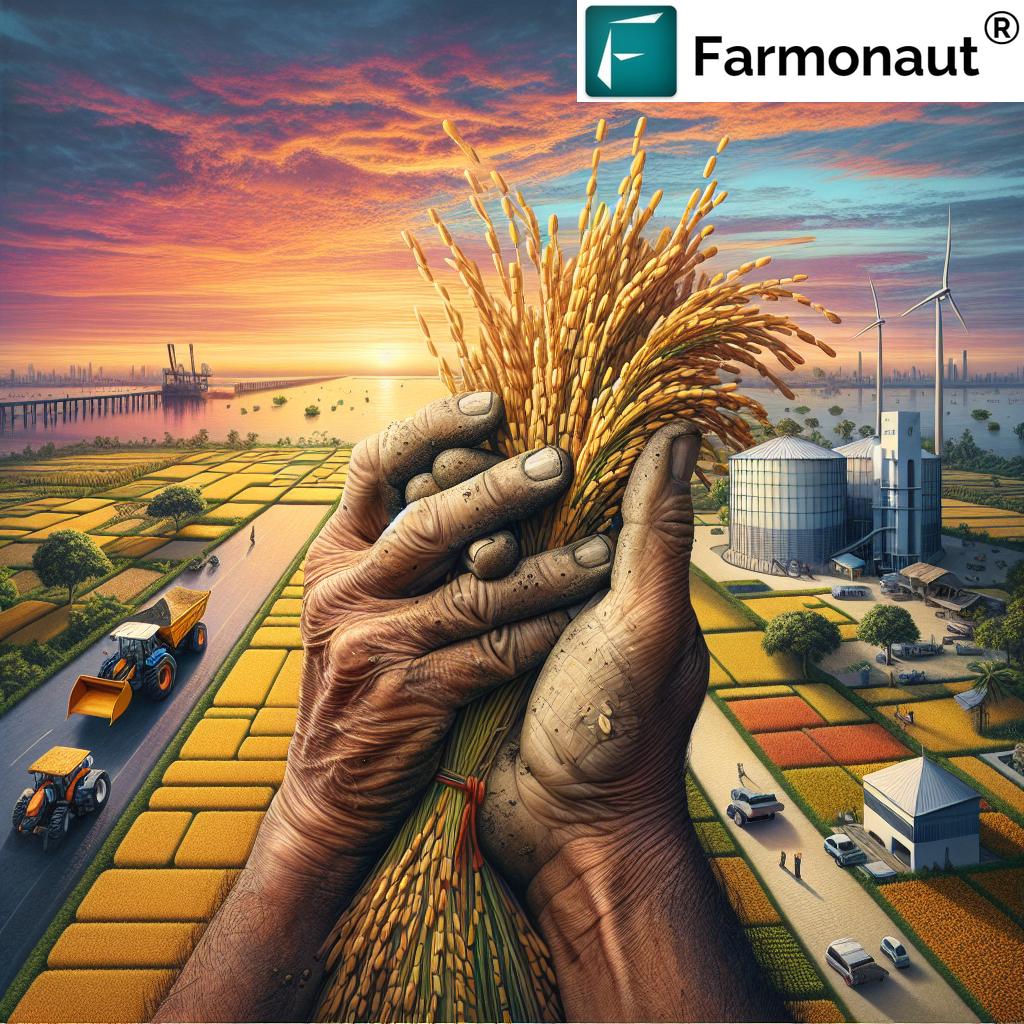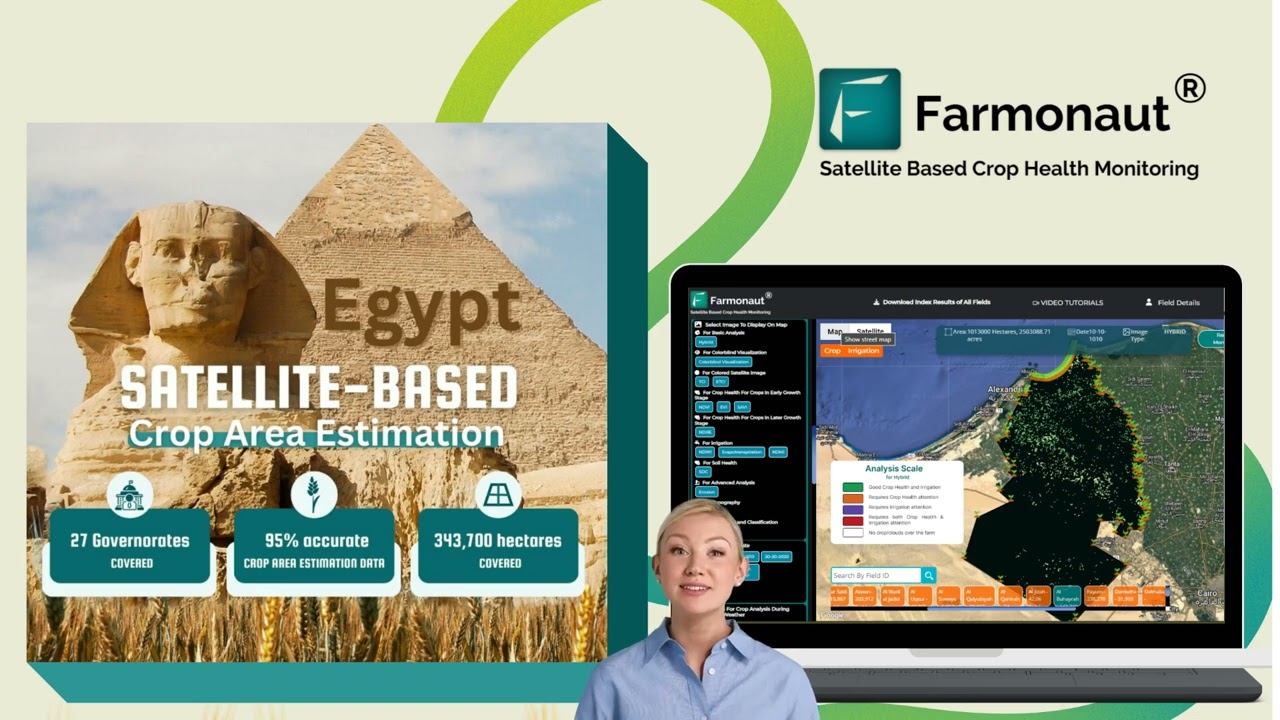Boosting Sustainable Rice Production in Nigeria: Innovative Dry Season Farming Techniques for Food Security
“Nigeria’s innovative dry season farming program targets 100 hectares of rice plantation to boost food security.”
In the heart of Nigeria’s agricultural landscape, a groundbreaking initiative is taking root, promising to revolutionize rice production and fortify food security across the nation. We’re excited to delve into the details of this innovative dry season farming program that’s set to transform the lives of small-holder farmers and bolster Nigeria’s agricultural sector. As we explore this transformative project, we’ll uncover how sustainable rice farming practices are being implemented to address the pressing need for increased food production in Africa’s most populous country.
The Genesis of Change: Introducing the Agricultural Development Program
The agricultural development program in Ogun State, Nigeria, marks a significant milestone in the country’s journey towards food self-sufficiency. This collaborative effort between government agencies and international organizations focuses on value chain development in agriculture, aiming to enhance agricultural productivity and improve farmer livelihoods. At its core, the program targets an impressive 100 hectares of rice plantation, providing a blueprint for sustainable growth in the agricultural sector.
Key components of this initiative include:
- Distribution of vital agro inputs for dry season farming
- Provision of essential resources like seeds, fertilizers, and herbicides
- Implementation of advanced irrigation techniques for rice cultivation
- Development of sustainable growth strategies to maximize land utilization
By emphasizing these elements, the program not only addresses immediate food security concerns but also lays the groundwork for long-term economic growth in local communities.

The Power of Collaboration: Government and International Support
The success of this agricultural revolution hinges on the strong collaboration between various stakeholders. The Nigerian government, particularly the Ministry of Agriculture, has played a pivotal role in spearheading this initiative. By allocating funds and providing counterpart funding, the government demonstrates its commitment to agricultural development and food security.
International organizations have also stepped up to the plate, offering expertise and resources to ensure the program’s success. This synergy between local and global entities creates a robust framework for sustainable agricultural growth, setting a precedent for future collaborations in the sector.
Empowering Small-holder Farmers: The Heart of the Initiative
At the core of this program lies a commitment to supporting small-holder farmers, who form the backbone of Nigeria’s agricultural sector. By providing these farmers with essential agro inputs and technical support, the initiative aims to:
- Increase rice production significantly
- Boost agricultural productivity
- Improve farmer livelihoods through increased income
- Enhance food security at both local and national levels
This focus on small-holder farmers not only addresses immediate food production needs but also contributes to poverty alleviation and rural development in Ogun State and beyond.
Innovative Dry Season Farming Techniques: A Game-Changer for Rice Production
One of the most exciting aspects of this program is the emphasis on dry season farming techniques. These innovative methods allow for year-round rice production, maximizing land use and significantly boosting overall yield. Key techniques include:
- Advanced irrigation systems to ensure adequate water supply during dry periods
- Drought-resistant rice varieties suited for dry season cultivation
- Precision agriculture practices to optimize resource use
- Integrated pest management strategies tailored for dry season conditions
By implementing these techniques, farmers can overcome the traditional limitations of seasonal farming, leading to more stable food production and income generation throughout the year.
The Role of Technology in Modern Agriculture
In today’s rapidly evolving agricultural landscape, technology plays a crucial role in enhancing productivity and sustainability. While our focus is on the innovative dry season farming techniques in Nigeria, it’s worth noting the broader technological advancements in agriculture. One such advancement is the use of satellite-based farm management solutions, which can significantly contribute to precision agriculture practices.
For instance, platforms like Farmonaut offer satellite-based crop health monitoring and AI-driven advisory systems that can complement on-ground farming techniques. These technologies provide valuable insights into crop health, soil moisture levels, and other critical metrics, helping farmers make informed decisions about irrigation, fertilizer usage, and pest management.
While not directly part of the Nigerian initiative we’re discussing, such technologies represent the future of agriculture and could potentially be integrated into similar programs to further boost productivity and sustainability.
Sustainable Growth Strategies: Balancing Productivity and Environmental Conservation
The program’s emphasis on sustainable growth strategies is a critical component of its long-term success. These strategies aim to balance the need for increased rice production with environmental conservation efforts. Key aspects include:
- Soil conservation techniques to prevent erosion and maintain fertility
- Water management practices to optimize irrigation and reduce waste
- Promotion of organic farming methods to minimize chemical inputs
- Crop rotation and diversification to maintain ecosystem balance
By implementing these sustainable practices, the program ensures that the boost in rice production doesn’t come at the cost of environmental degradation, setting a precedent for responsible agricultural development.
Impact on Food Security: A Step Towards Self-Sufficiency
The ramifications of this innovative program extend far beyond the immediate increase in rice production. By focusing on a staple crop like rice, the initiative addresses a fundamental aspect of Nigeria’s food security challenge. The expected outcomes include:
- Reduced dependence on rice imports
- Stabilization of rice prices in local markets
- Improved nutrition for local communities
- Enhanced resilience against global food price fluctuations
These outcomes collectively contribute to Nigeria’s journey towards food self-sufficiency, a crucial goal for the nation’s long-term economic and social stability.

Economic Implications: Boosting Local Economies and Internal Revenue Generation
The economic impact of this agricultural initiative extends beyond the farm gates. By boosting rice production and supporting small-holder farmers, the program sets in motion a ripple effect of economic benefits:
- Increased income for farmers leads to higher spending in local economies
- Growth in agricultural productivity creates job opportunities in related sectors
- Enhanced internal revenue generation for Ogun State through increased agricultural output
- Potential for value-added industries around rice production (e.g., processing, packaging)
These economic benefits contribute to the overall development of rural areas and help bridge the urban-rural divide in Nigeria.
“The agricultural initiative in Ogun State, Nigeria, provides essential resources to small-holder farmers across 100 hectares.”
Capacity Building and Knowledge Transfer: Empowering Farmers for the Long Term
A crucial aspect of the program’s sustainability lies in its focus on capacity building and knowledge transfer. By equipping farmers with the skills and knowledge needed to implement advanced farming techniques, the initiative ensures long-term success beyond the initial implementation phase. Key elements of this capacity-building effort include:
- Training workshops on dry season farming techniques
- Education on sustainable agricultural practices
- Guidance on using modern farming equipment and technologies
- Mentorship programs pairing experienced farmers with newcomers
This emphasis on education and skill development empowers farmers to adapt to changing agricultural landscapes and continue innovating in their practices.
Challenges and Opportunities: Navigating the Path to Success
While the program promises significant benefits, it’s important to acknowledge the challenges that may arise during implementation. These challenges present opportunities for further innovation and adaptation:
- Climate variability and its impact on dry season farming
- Infrastructure needs for efficient irrigation and transportation
- Market access and price stability for increased rice production
- Balancing traditional farming practices with modern techniques
Addressing these challenges head-on will be crucial for the program’s long-term success and sustainability.
The Future of Rice Farming in Nigeria: Scaling Up and Replication
As we look to the future, the potential for scaling up this innovative program is immense. The success in Ogun State can serve as a blueprint for similar initiatives across Nigeria and even beyond its borders. Key considerations for future expansion include:
- Adapting the program to different ecological zones within Nigeria
- Integrating more advanced technologies like precision agriculture and satellite monitoring
- Expanding the focus to include other staple crops alongside rice
- Developing stronger links between farmers and markets to ensure sustainable demand
By learning from the successes and challenges of this initial program, Nigeria can pave the way for a more robust and resilient agricultural sector.
Comparative Analysis: Traditional vs. Innovative Dry Season Rice Farming
To better understand the impact of the innovative dry season farming techniques introduced by the program, let’s compare them with traditional rice farming methods:
| Farming Technique | Water Usage (estimated m³/hectare) | Yield (estimated tons/hectare) | Input Requirements | Environmental Impact | Economic Benefits (estimated revenue increase %) |
|---|---|---|---|---|---|
| Traditional Rice Farming | 15,000 – 20,000 | 2 – 3 | High (seeds, fertilizers, pesticides) | Medium to High | Baseline |
| Dry Season Farming with Program Support | 8,000 – 12,000 | 4 – 6 | Moderate (optimized inputs) | Low to Medium | 30% – 50% |
This comparison clearly illustrates the advantages of the new techniques, highlighting improved resource efficiency, increased yields, and substantial economic benefits. The innovative approach not only conserves water but also significantly boosts productivity while reducing environmental impact.
The Role of Technology in Modern Agriculture: Enhancing Precision and Efficiency
While our focus has been on the innovative dry season farming techniques in Nigeria, it’s worth noting the broader technological advancements in agriculture that could complement such initiatives. For instance, satellite-based farm management solutions can provide valuable insights to enhance precision agriculture practices.
Platforms like Farmonaut offer services such as satellite-based crop health monitoring and AI-driven advisory systems. These technologies can provide farmers with real-time data on crop health, soil moisture levels, and other critical metrics, helping them make informed decisions about irrigation, fertilizer usage, and pest management.
While not directly part of the Nigerian initiative we’re discussing, such technologies represent the future of agriculture and could potentially be integrated into similar programs to further boost productivity and sustainability. For those interested in exploring these technological solutions, more information is available through Farmonaut’s API and API Developer Docs.
Community Impact: Beyond the Fields
The ripple effects of this agricultural initiative extend far beyond the rice fields. By empowering farmers and boosting local food production, the program is set to transform entire communities. Some of the broader impacts include:
- Improved food security at the household level
- Enhanced nutritional outcomes, especially for children
- Increased school attendance as families become more financially stable
- Growth of ancillary businesses in rural areas
- Reduction in rural-urban migration as farming becomes more profitable
These community-wide benefits underscore the holistic approach of the program, addressing not just agricultural productivity but overall rural development.
Environmental Considerations: Balancing Productivity and Sustainability
As we push for increased agricultural productivity, it’s crucial to maintain a focus on environmental sustainability. The dry season farming techniques introduced by this program are designed with environmental considerations in mind:
- Water conservation through efficient irrigation systems
- Reduced chemical inputs through integrated pest management
- Soil conservation practices to maintain long-term fertility
- Promotion of biodiversity in and around rice fields
By prioritizing these environmental aspects, the program ensures that the boost in rice production doesn’t come at the cost of ecological degradation, setting a model for sustainable agricultural intensification.
Looking Ahead: The Future of Food Security in Nigeria
As we conclude our exploration of this groundbreaking initiative in Ogun State, it’s clear that the implications for Nigeria’s food security are profound. This program serves as a beacon of innovation, demonstrating how targeted interventions in agriculture can yield significant results in food production, economic development, and community well-being.
Looking ahead, the success of this program could pave the way for:
- Expansion of dry season farming techniques to other crops and regions
- Increased investment in agricultural research and development
- Greater emphasis on farmer education and capacity building
- Development of more robust agricultural value chains
- Enhanced collaboration between government, international organizations, and local communities
As Nigeria continues to strive for food self-sufficiency, initiatives like this serve as crucial stepping stones towards a more food-secure future. By embracing innovation, sustainability, and collaboration, Nigeria is not just addressing its immediate food security challenges but is also laying the groundwork for a thriving agricultural sector that can serve as a model for other nations facing similar challenges.
Frequently Asked Questions (FAQ)
Q1: What is the main goal of the dry season farming program in Nigeria?
A1: The main goal is to boost sustainable rice production, enhance food security, and improve the livelihoods of small-holder farmers in Nigeria, particularly in Ogun State.
Q2: How many hectares of rice plantation does the program target?
A2: The program targets 100 hectares of rice plantation in Ogun State.
Q3: What resources are provided to farmers under this initiative?
A3: Farmers receive essential agro inputs including seeds, fertilizers, herbicides, and access to irrigation techniques for dry season farming.
Q4: How does this program contribute to food security in Nigeria?
A4: By increasing rice production, the program reduces dependence on imports, stabilizes local rice prices, and improves food availability and accessibility.
Q5: What are the environmental considerations in this agricultural initiative?
A5: The program emphasizes sustainable farming practices, including water conservation, soil management, and reduced chemical inputs to minimize environmental impact.
Q6: How does the program support small-holder farmers?
A6: It provides farmers with resources, training, and technical support to improve their agricultural productivity and increase their income.
Q7: What are the economic benefits of this agricultural program?
A7: The program boosts local economies, creates job opportunities, enhances internal revenue generation, and improves farmer livelihoods.
Q8: How does dry season farming differ from traditional rice farming?
A8: Dry season farming uses innovative irrigation techniques and drought-resistant varieties to enable year-round production, increasing overall yield and efficiency.
Q9: What role does technology play in this agricultural initiative?
A9: While not directly part of the program, advanced technologies like satellite-based monitoring and AI-driven advisory systems can complement and enhance the effectiveness of these farming techniques.
Q10: How can the success of this program in Ogun State be replicated in other regions?
A10: The program’s success can serve as a blueprint for similar initiatives, adapting the techniques to different ecological zones and potentially expanding to include other staple crops.
In conclusion, the innovative dry season farming program in Nigeria represents a significant step forward in the country’s quest for food security and agricultural sustainability. By empowering small-holder farmers, embracing advanced farming techniques, and focusing on sustainable practices, this initiative not only addresses immediate food production needs but also lays the groundwork for long-term agricultural prosperity. As we look to the future, the success of this program in Ogun State serves as an inspiring model for agricultural development across Nigeria and beyond, promising a more food-secure and economically vibrant future for rural communities.




















